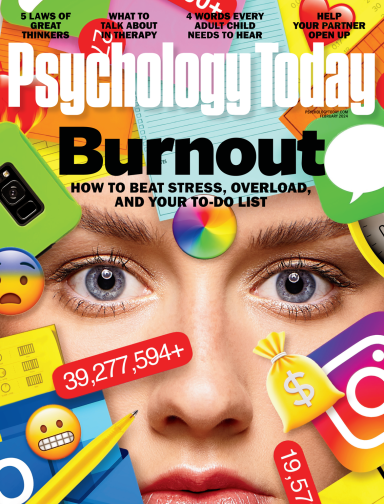Career
How to Figure Out What You Want in Life
Stop feeling confused and overwhelmed; this exercise will help you gain clarity.
Posted September 30, 2019 Reviewed by Jessica Schrader

A lot of people come to work with me because they feel stuck, and they want to change their life. But one of the first obstacles we run into is that when I ask them what they want their life to look like, they often don’t know.
Knowing what you want is the first and most important step in creating a better future. But how do you make this important decision? Trying to decide what you want in a world full of so many choices can seem overwhelming.
On the other hand, most people have a very good idea of what they don’t want in life. We look around and see all the terrible things happening in the world, and we realize we don’t want war, we don’t want poverty, we don’t want sickness.
We look at our own lives and think about the things that don’t feel right, such as the boss who nags, the spouse who isn’t supportive, the kids who don’t listen, or the empty checking account. You may have thoughts like: "I don’t want to be poor," "I don’t want to work at this lousy job where no one appreciates me," or "I don’t want to have to deal with the screaming kids who never listen."
The good news is if you can identify what you don’t want, knowing what you do want is definitely within your reach. To perceive anything, there must be a contrast between the two states. To know that something is unwanted, we must know that something else is wanted instead. One serves as the reference point for the other.
For example, we could not identify the wanted state of happiness if we did not know what it was like to experience the unwanted state of being unhappy. The reason you can identify what you don’t want is that you are aware some other, preferable state exists, otherwise you wouldn’t know it was unwanted. You simply have to give more of your attention to the wanted state and give it some clarity.
Once you have identified what you don’t want, see if you can flip it over and find the contrasting wanted state. If you don’t want to live in the city, perhaps it is because you prefer a slower country pace. If you don’t want to work in a retail job, but you aren’t sure what kind of job you would like, write down as many details as you can about what you don’t like in retail. For example, "I don’t like retail because it’s exhausting to stand on my feet all day. Instead, I would like a job where I could spend more time at a desk."
Once you have identified what you don’t want, ask yourself: What would I like to see instead?
Examples:
Don’t want: I don’t want a spouse who doesn’t appreciate me.
Want: I want a spouse who adores me and treats me with respect.
Don’t want: I don’t want to work at this lousy job.
Want: I want a job that stimulates me intellectually and allows me to be creative.
Get as specific as possible. Once you have decided you want a job that is stimulating and creative, start thinking about other aspects of the job you would like, such as independence, a lot of interaction with coworkers, increased responsibility, a better salary. The more details you include, the more specific you can be in developing the plan and the steps necessary to achieve your goal.
A worksheet to help with this can be found here.
Deciding what you want today does not mean you can’t change your mind tomorrow. Often, we think we want something, but as we find out more about it, we change our minds. Consider this a success, not a failure. It doesn’t mean you don’t know what you want; it means you know you want something else instead.
Focus on that “something else instead,” and go in that direction. Deciding that you don’t want something that you thought you did, just means you are making a more informed decision with new data that wasn’t available to you before; it is not the same as giving up when things get difficult.
Also, keep in mind there is no final destination in life. Every time you obtain something you want, you have a new perspective from which to see other possibilities. Choosing something you want doesn’t mean you give up all other possibilities; it means you open the door to possibilities you didn’t know existed.
If you find yourself looking at your list of wants and saying, I don’t really believe I can have what I want, then you have a different issue about your expectations of the future. You act on what you expect, not what you want—so your expectations need to align with your wants, or you won’t be able to achieve them.
To work on changing your expectations, you may wish to check out my TEDx talk on exactly this topic or read my book Think Forward to Thrive, which is all about developing the skills you need to create a better future.
References
Vilhauer, Jennice (2014). Think Forward to Thrive: How to Use the Mind's Power of Anticipation to Transcend Your Past and Transform Your Life. New World Library. Novato, CA.




